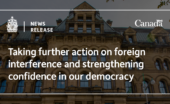Re Ian Bremmer 'Could third-party candidates upend the 2024 US election?' 3 April The current political movement in the USA…
Wednesday Night #1801
Written by Diana Thebaud Nicholson // September 7, 2016 // Wednesday Nights // Comments Off on Wednesday Night #1801
Once again, we thank the loyal folk who braved the threat of a monster rainstorm to join us in celebrating #1800. It was a delightful evening, filled with happy memories of the greater Wednesday Night family, summed up with verve by WN poet Laureate, Wanda P. Bless you all!
Fall may only begin officially on September 22, but for us, once the long weekend is over, it has begun – schools are back in session, offices again have a full work force and instead of festivals, the calendar is full of conferences.
On our calendar is the presentation by the CIC in partnership with the U.S. Consulate General of a discussion on the upcoming presidential election with two former members of the US Congress: Steven K. Kuykendall (Republican) who served in the House of Representatives from 1999 to 2001 representing California’s 36th Congressional District, and Congressman Martin Lancaster (Democrat), who represented North Carolina’s 3rd Congressional District from 1987 to 1995. Although no longer congressmen, both have impressive bios that highlight their competence to lead what should be a fascinating dialogue. The two speakers are on a cross-Canada tour as part of the “Congress to campus” program. We are delighted that Guillaume Lavoie will be the moderator of this event, which will be held at the University Club on Tuesday, 27 September. Details to follow.
The New York Times headline that greeted us on Tuesday: On Labor Day, Donald Trump and Hillary Clinton Begin a Final Sprint
Theoretically, the campaign should start in earnest after Labor (U.S.) Day – this one seems to have gone on for an eternity and outcomes ae less and less certain.
Nate Silver of FiveThirtyEight writes in Election Update: Clinton’s Lead Keeps Shrinking that the degree of uncertainty about this election is due to several factors: the unusually early conventions and the late election — Nov. 8 is the latest possible date on which Election Day can occur — and just as important, many voters — close to 20 percent — either say they’re undecided or that they plan to vote for third-party candidates. At a comparable point four years ago, only 5 to 10 percent of voters fell into those categories.
High numbers of undecided and third-party voters are associated with higher volatility and larger polling errors. Put another way, elections are harder to predict when fewer people have made up their minds.
If you have any doubts concerning the basis of appeal of Bernie Sanders’ (and Donald Trump’s) message that Washington is ‘broke and needs fixing’, look no further than the New York Times headline Senate Democrats Block Zika Bill Over Planned Parenthood Provisions
As Congress returned from a seven-week recess on Tuesday, Senate Democrats again stymied a $1.1 billion plan to fight the Zika virus, demanding that Republicans drop an effort to block Planned Parenthood from receiving money to combat the mosquito-borne disease.
Meanwhile in another Zika-related story, local (county) officials invoked a “clear and public health crisis” to justify spraying the neurotoxin Naled from the air to control the mosquito population – in doing so, they killed millions of bees and prompted fears of longer-term effects including possible genetic die-offs or sterility for bees that survive the first sprays, as well as careless mixture and application of chemicals, mismanagement and long-term imbalance in the ecosystem. Presumably those enlightened county officials were unaware of the alarm over the decline of the bee population and the vital importance of pollination to agriculture.
We are sure that no Wednesday Nighter has any secrets that s/he would worry about being subject to hacking, however, maybe you don’t know or think about anyone Hacking Your Phone – after all, what information would a hacker glean? Watch the fascinating 60 Minutes segment and be afraid – very afraid. If you just have somebody’s phone number, what could you do? Answer from the professionals: Track their whereabouts, know where they go for work, which other people they meet when– You can spy on whom they call and what they say over the phone. And you can read their texts. Creepy!
On the other hand, as Miles O’Brien reports for Nova in Can the high-tech hunt for terrorists stop lone wolf attacks? “The data is hiding in plain view. All it takes is patience, persistence and a little bit of technical know-how to find it. For instance, many Islamic State fighters do not disable the geographic tracking capability built into their mobile phones.” So, now how do you feel about your privacy?
The Hangzhou G20 Summit is over, after Barack Obama ‘deliberately snubbed’ by Chinese in chaotic arrival at G20, and other incidents that were or were not orchestrated by the Chinese authorities (depending on your viewpoint) . A pretty anodyne communiqué was issued, the central points of which are :
We believe that closer partnership and joint action by G20 members will boost confidence in, foster driving forces for and intensify cooperation on global economic growth, contributing to shared prosperity and better well-being of the world.
We are determined to foster an innovative, invigorated, interconnected and inclusive world economy to usher in a new era of global growth and sustainable development, taking into account the 2030 Agenda for Sustainable Development, the Addis Ababa Action Agenda and the Paris Agreement.
In this context, we, the G20, as the premier forum for international economic cooperation, forge a comprehensive and integrated narrative for strong, sustainable, balanced and inclusive growth, and thereby adopt the attached package of policies and actions – the Hangzhou Consensus.
Nobody mentioned the awkward subject of the South China Sea (at least not aloud).
Immediately following the G20, Laos hosts the ASEAN Summit where President Obama addressed the problem of the huge amount of unexploded ordnance, known as UXO left from the bombings of Laos during the “Secret War”.
Next year, the 50th anniversary of the founding of ASEAN, it is proposed to include his successor along with Canadian Prime Minister Justin Trudeau, Japanese Prime Minister Shinzo Abe, South Korean President Park Geun-hye, and Chinese President Xi Jinping – that is, if Philippine President “Duterte Harry” hasn’t offended all of them.
We highly recommend the Chatham House paper The Asia-Pacific Power Balance: Beyond the US–China Narrative that examines the roles of other regional actors such as Japan and India, new instruments of leverage in the region, and the extent and complexity of changing relationships.
Prime Minister Trudeau is heading home after what appears to be a fairly successful trip to China. His last day was in Hong Kong, where he gave a speech to the Canadian Chamber of Commerce and shared that when he had raised concerns directly with China’s political elite about their human-rights record, he also acknowledged that Canada isn’t perfect. The comparison is bound to ruffle more than a few feathers at home. He avoided any comment about Sunday’s historic election of “umbrella activists” to the Hong Kong legislature, fobbing off questions with the standard reply that “we’ll work with whoever gets elected and forms government in foreign jurisdictions. ” Diplomatic, under the circumstances. No need to make his hosts any grumpier than they surely were.
In Hong Kong, elections, while in Brazil, it was the impeachment of Dilma Rousseff, Brazil’s first female President – a sorry tale that does not reflect well on the happy images portrayed in the brilliant closing ceremony of the Olympics, only 10 days before. And now, The Paralympics begin in Rio. Featuring thousands of athletes from 161 countries, the Games are facing major budget cuts affecting everything from venues to staffing. The Canadian contingent is large and deserves (as do all the amazing Paralympians) our support. From the opening ceremony on Sept. 7 through to the closing ceremony on Sept. 18, CBC will broadcast more than 1,000 hours of multi-platform coverage, the most of any Paralympics in Canadian history.
Meanwhile, at home the National sport for the next months will be divining what changes will be wrought with Peter Mansbridge’s departure.
Some of us are mathphobes, certainly due in no small part to uninspired teaching in early school. Thus, we are envious of the little ones benefiting from –and obviously enjoying – the “Building Blocks” curriculum introduced in Boston public schools. It is designed to encourage very young children to think and talk about math concepts throughout the days, by providing lessons through innovative games. Counting the benefits of teaching math to 3-year-olds.
Do bring us your phobias, along with your passions!



